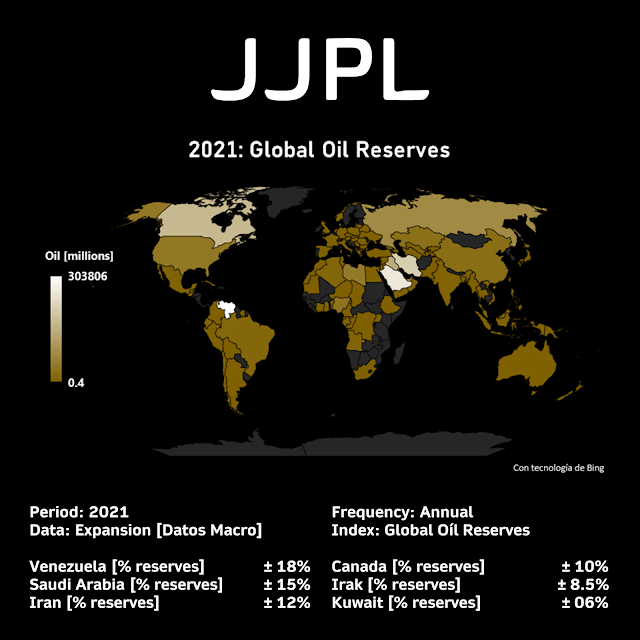🛢️ GEOPOLITICS: OIL 🛢️
There are 15 countries which control the ± 93% of global reserves (Venezuela, Saudi Arabia, Iran, Canada, Iraq, Kuwait, United Arab Emirates, Russia, Libya, USA, Nigeria, Kazakhstan, China, Qatar and Brazil). Of those, only Canada, USA and Brazil could have a great link with the West, controlling ± 14% of the reserves. However, BRICS (Brazil, Russia, India, China and South Africa) could control only the ± 7% of reserves.
Perhaps the most important is OPEP (Algeria, Angola, Ecuador, Gabon, Iraq, Iran, Qatar, Kuwait, Libya, Nigeria, Saudi Arabia, Venezuela, and the UAE). They control the ± 74% of current oil global reserves. Nevertheless, only with Venezuela, Arabia, Iran, Iraq, Kuwait, EAU, Russia, China and Kazakhstan (countries with minimal enthusiasm for being US allies) control the 73% of global reserves.
Paradoxically, the Western developed world (Canada, USA, Norway, UK, Australia, Denmark, Spain, Netherlands, Germany, France and Japan) only has ± 14% of the reserves. Surely, the alarms about the climate crisis are not for an environmental reason (ultimately, they are the most polluting countries), but for a strategic one. The American Pax has ended and the Multipolar World is on. It is crucial for their survival to eliminate any dependence on oil and to punish whoever does so.
Nuclear and some renewable energies can be a partial answer. As a matter of fact, any smart Energy Security policy must consider many sources, especially if you do not have good relations with some producers. Finally, the real problem will come when many underdeveloped countries want to industrialize and fight for the "cheapest" resources, making their aspirations unsustainable.
The best analysis is yours!
Perhaps the most important is OPEP (Algeria, Angola, Ecuador, Gabon, Iraq, Iran, Qatar, Kuwait, Libya, Nigeria, Saudi Arabia, Venezuela, and the UAE). They control the ± 74% of current oil global reserves. Nevertheless, only with Venezuela, Arabia, Iran, Iraq, Kuwait, EAU, Russia, China and Kazakhstan (countries with minimal enthusiasm for being US allies) control the 73% of global reserves.
Paradoxically, the Western developed world (Canada, USA, Norway, UK, Australia, Denmark, Spain, Netherlands, Germany, France and Japan) only has ± 14% of the reserves. Surely, the alarms about the climate crisis are not for an environmental reason (ultimately, they are the most polluting countries), but for a strategic one. The American Pax has ended and the Multipolar World is on. It is crucial for their survival to eliminate any dependence on oil and to punish whoever does so.
Nuclear and some renewable energies can be a partial answer. As a matter of fact, any smart Energy Security policy must consider many sources, especially if you do not have good relations with some producers. Finally, the real problem will come when many underdeveloped countries want to industrialize and fight for the "cheapest" resources, making their aspirations unsustainable.
The best analysis is yours!
Copyright. Joel Padilla 2023

Comentarios
Publicar un comentario